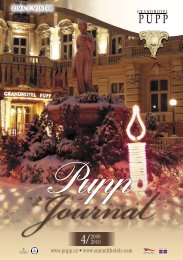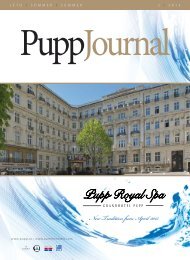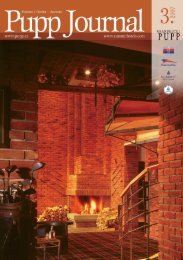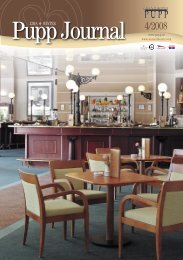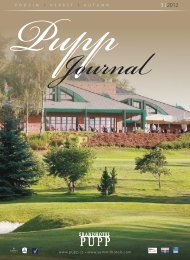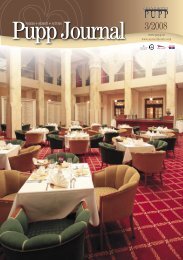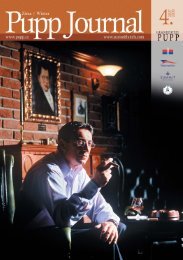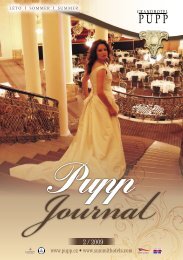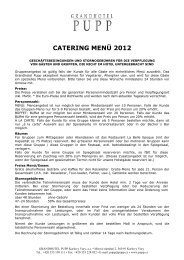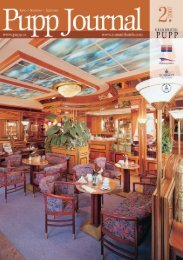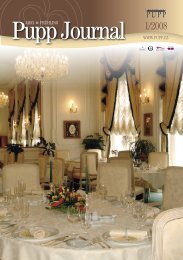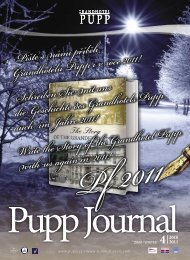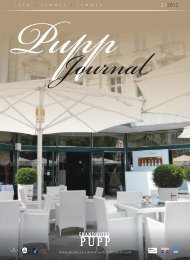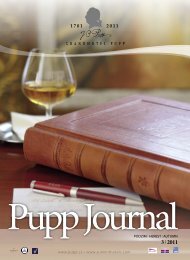Pupp Journal Jaro 2010 - Grandhotel Pupp
Pupp Journal Jaro 2010 - Grandhotel Pupp
Pupp Journal Jaro 2010 - Grandhotel Pupp
Create successful ePaper yourself
Turn your PDF publications into a flip-book with our unique Google optimized e-Paper software.
HISTORIE<br />
GESCHICHTE | HISTORY<br />
Beethovenův koncert v Českém sále / Beethovens Konzert im Böhmischen Saal / Beethoven's concert in the Bohenmian Hall<br />
schaftlicher Kämpfer gegen den Tyrannen<br />
Napoleon und ein häufiger Gast von Karlsbad<br />
Theodor Körner (l79l - l8l3) eine Buchsammlung<br />
von 23 lyrischen Gedichten heraus, in der er die<br />
Sprudelstadt und ihre Umgebung verherrlichte.<br />
Eine von ihnen verehrt mit gehobenen Versen<br />
den zarten Zauber des Tanzes im Sächsischen<br />
Saal. Das Gedicht druckte Franz Sartori in seinem<br />
Karlsbader Reiseführer aus dem Jahre 1817 ab.<br />
Eine große Feier erlebten der Böhmische und der<br />
Sächsische Saal am 3. Juli 1812, als sie selbst der<br />
österreichische Kaiser Franz I. besichtigte, begleitet<br />
von seiner Tochter Maria Louise, der französischen<br />
Kaiserin. Man muss wohl nicht sagen, dass<br />
die höchsten Gäste in den Sälen großartig willkommen<br />
wurden. Am Abend fand zu Ehren des<br />
Kaisers ein Festumzug von 1500 Bergleuten aus<br />
den Bergstädten der Karlsbader Umgebung statt.<br />
Es dauerte nicht lange und in der Konzerthalle<br />
des Böhmischen Saales trat eine der größten<br />
Persönlichkeiten der Weltmusikgeschichte auf. Zu<br />
einem außergewöhnlichen Fest für den Böhmischen<br />
Saal und das Karlsbader Musik liebende<br />
Publikum wurde der 6. August 1812. Das Genie<br />
Ludwig van Beethoven (1770 - 1827), der hier<br />
gerade zur Kur weilte, gab hier, mit dem italienischen<br />
Geigenspieler Giovanni Battista Polledro<br />
aus Turin, ein Wohltätigkeitskonzert für die<br />
Einwohner des abgebrannten Kurortes Baden bei<br />
Wien. Beethoven und Polledro spielten die Große<br />
Sonate und einige „freie Phantasien“. Der Eintritt<br />
war freiwillig. Der Konzertertrag betrug 958<br />
Gulden, was aber von weiten nicht so viel war,<br />
wie viel Beethoven erwartete. Der enttäuschte<br />
Meister schrieb am 12. August 1812 an seinen<br />
Mäzen Erzherzog Rudolf, dass er in Karlsbad „ein<br />
armes Konzert für Arme“ spielte. Während seines<br />
Aufenthalts in Karlsbad wohnte Beethoven im Hause<br />
Auge Gottes, an dem heute eine Gedenktafel ist.<br />
ENGLISH<br />
Goethe’s Pictures and Poems and<br />
Beethoven’s Concert<br />
It is not common knowledge that the works of<br />
some painters and classic German poets are closely<br />
linked with <strong>Grandhotel</strong> <strong>Pupp</strong>, specifically, with<br />
Czech and Saxony Halls and the Alley. In 1808,<br />
the poet and Jack of all trades from Weimar,<br />
Johann Wolfgang von Goethe (1749-1832), drew<br />
a picture of Czech and Saxony Halls as viewed<br />
from Keglevic’s Cross. Today, the outstanding<br />
wash drawing is among the collections of Goethe’s<br />
Memorial in Weimar. In the same year, Goethe<br />
also drew a wash veduta of <strong>Pupp</strong> Alley. A year<br />
before (1807), he wrote a sixain perfectly expressing<br />
his affection and admiration for Carlsbad:<br />
Carlsbad<br />
What I experienced and learned there,<br />
What budded in my soul,<br />
What delight, what knowledge,<br />
A far too long a confession!<br />
May everyone enjoy themselves,<br />
Both familiar and new!<br />
4th August. He heard her again on 6th August<br />
1818 at The Golden Well where she sang in a private<br />
performance to the guests of Josef, the Prince<br />
of Schwarzenberg, the brother of Karl Schwarzenberg,<br />
who won the Battle of Leipzig in 1813. Admission<br />
to her concerts at the Post Yard was two guldens.<br />
In connection with this story, we should mention<br />
that Goethe became so fond of The Golden Well<br />
that he wanted to buy the house and settle in<br />
Carlsbad for good. Due to unknown reasons,<br />
however, he abandoned his plan. Goethe’s friend,<br />
Elise von der Recke, confirmed his intent in her<br />
letter of 25th July 1807: Goethe‘s intent does not<br />
surprise me as Carlsbad may stand comparison<br />
even with Salzburg, Tyrol, Italy, or Switzerland.<br />
In 1811, Theodor Körner (1791-1813), a young<br />
poet, a passionate campaigner against Napoleon,<br />
and a frequent visitor to Carlsbad, published a<br />
collection of 23 lyric poems celebrating the spa<br />
and its surroundings. High-toned verses of one of<br />
the poems laud the delicate magic of dancers at<br />
the Saxony Hall. It was published by Franz Sartori<br />
in his Carlsbad guide in 1817.<br />
The Czech and Saxony Halls were witness to unprecedented<br />
festivities on 3rd July 1812 when they<br />
were visited by Emperor Franz I of Austria in the<br />
company of his daughter, Marie Louise, Empress of<br />
the French. There is, indeed, no need to mention<br />
that the noble guests received a grand welcome at<br />
both the halls. A gala promenade of 1,500 miners<br />
from the mining towns surrounding Carlsbad took<br />
place in the evening in honor of the Emperor.<br />
Presently, the concert hall of Czech Hall hosted<br />
one of the greatest personages of world music<br />
history. The sixth day of August in the year 1812<br />
became an extraordinary and remarkable day for<br />
both Czech Hall and Carlsbad music lovers when<br />
a charity concert for the people of the Baden spa<br />
near Vienna, which was devastated by fire, was<br />
given by the musical genius Ludwig van Beethoven<br />
(1770 - 1827) and Italian violinist Giovanni Battista<br />
Polledro of Turin.<br />
Beethoven and Polledro performed the Grand<br />
Sonata and a number of “free fantasies.“ The fee<br />
for admission was voluntary. The funds raised by<br />
the concert amounted to 958 guldens, an amount<br />
which was less than Beethoven had expected. On<br />
12th August 1812, the disappointed Maestro wrote<br />
to his benefactor, Archduke Rudolf, that he had<br />
played a “poor concert for the poor“ in Carlsbad.<br />
During his stay in Carlsbad, Beethoven resided at<br />
God’s Eye, which today bears a memorial plaque.<br />
Český sál, Boží oko a Alej, mědirytina z doby kolem roku 1815<br />
Der Böhmische Saal, das Auge Gottes und die Allee, ein Kupferstich aus der Zeit um 1815<br />
The Bohemian Hall, the God´s Eye House and the Avenue, a copperplate engraving from about 1815<br />
On 14th August 1818, at The Golden Well house<br />
standing next to Saxony Hall, Goethe wrote a poem<br />
praising the art of the celebrated Italian singer,<br />
Angelica Catalani-Valabréque (1782-1849). He<br />
had heard her perform earlier at the Post Yard<br />
where the soprano gave two concerts on 1st and<br />
Goethova báseň na dnešní Goethově stezce<br />
Goethes Gedicht auf dem heutigen Goethe Weg<br />
Goethe's poem at the present Goethe Path<br />
www.pupp.cz 19



